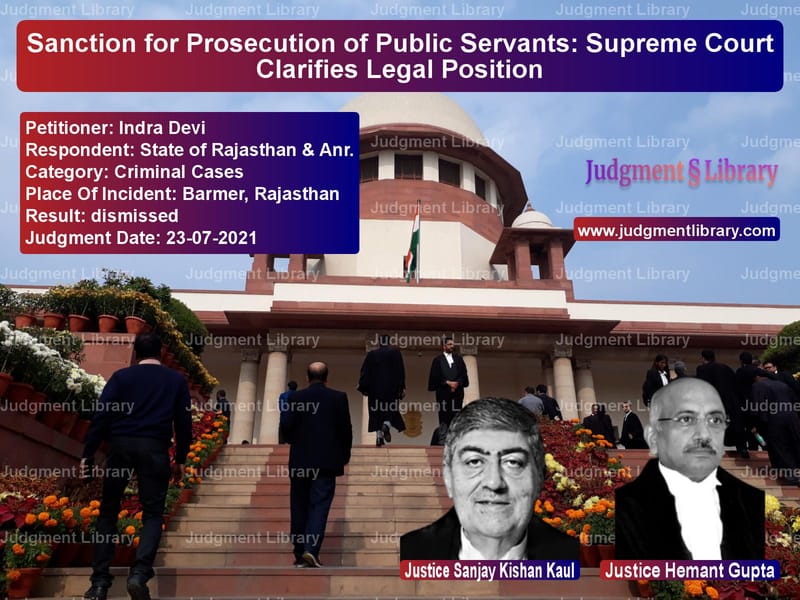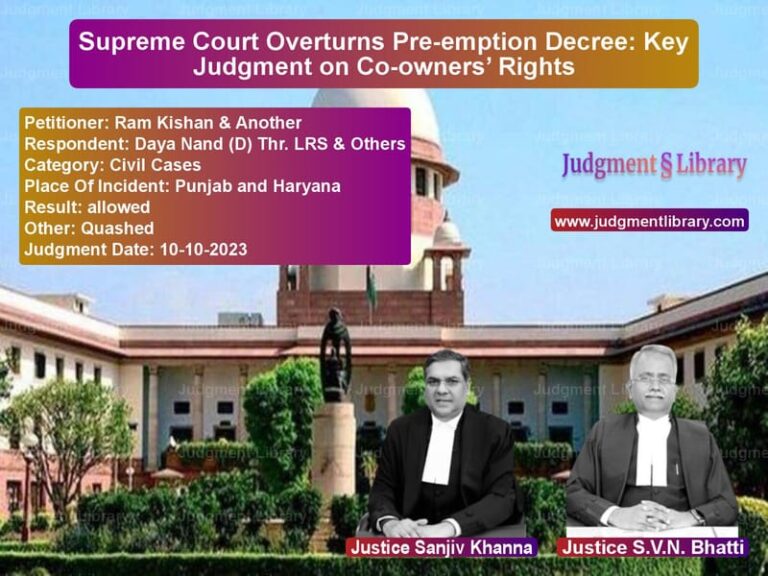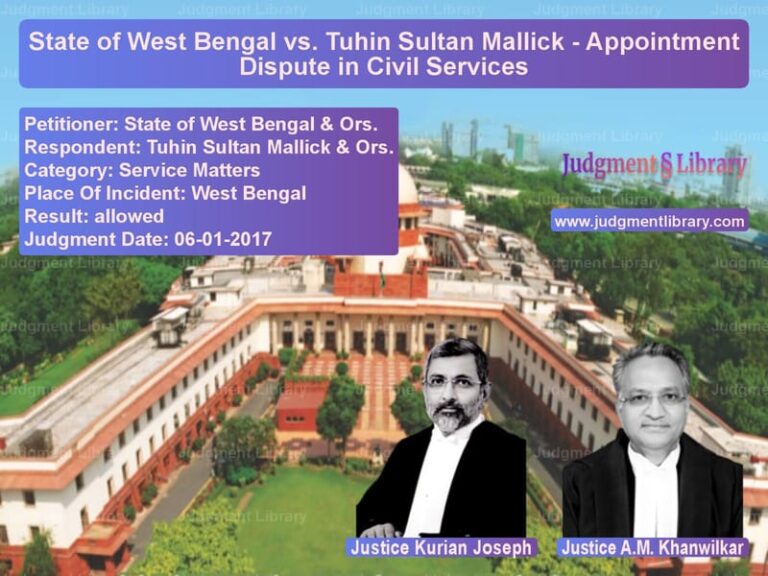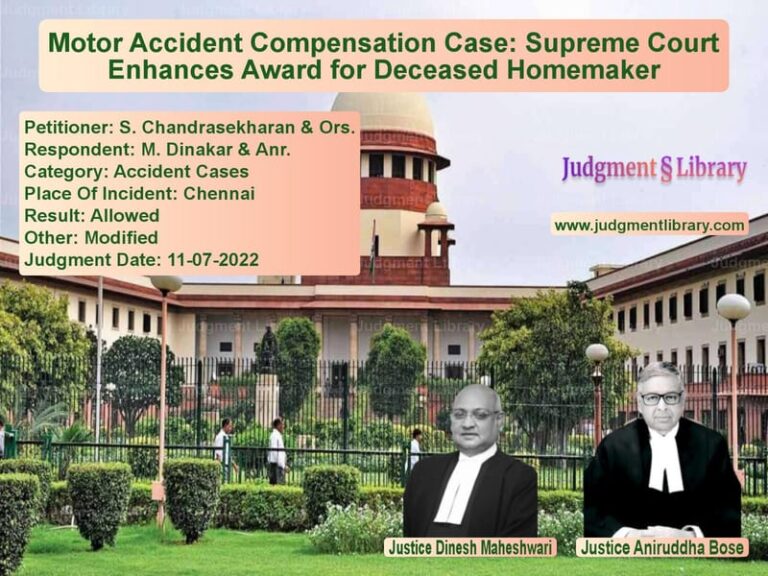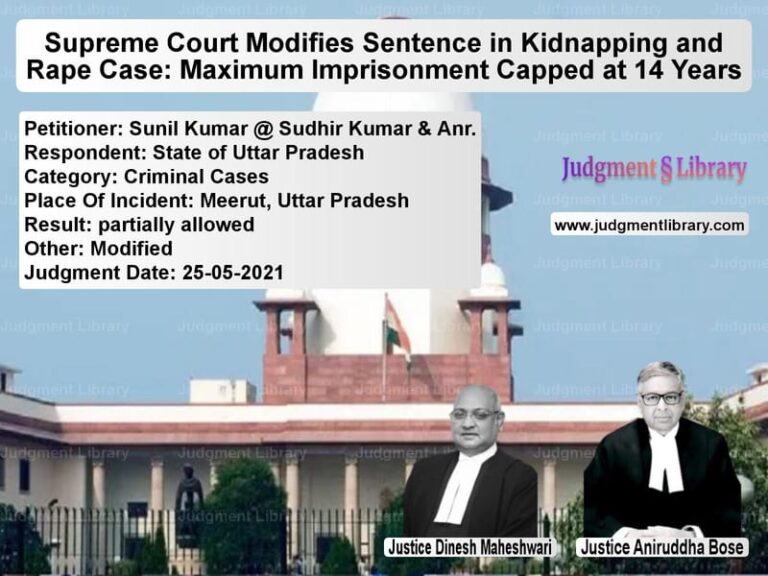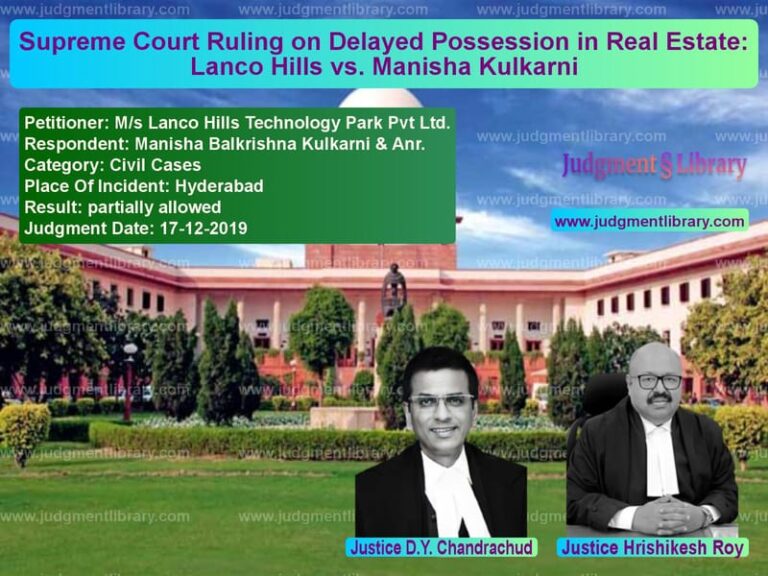Sanction for Prosecution of Public Servants: Supreme Court Clarifies Legal Position
The Supreme Court of India, in its judgment dated 23rd July 2021 in the case of Indra Devi v. State of Rajasthan & Anr., examined the issue of whether a public servant is entitled to protection under Section 197 of the Code of Criminal Procedure (CrPC) when accused of wrongdoing in official duties. The case involved allegations of fraudulent land transactions and misappropriation of public office. The ruling, delivered by Sanjay Kishan Kaul and Hemant Gupta, reaffirmed that public servants require prior sanction before prosecution if the alleged acts are reasonably connected to their official duties.
The Supreme Court upheld the Rajasthan High Court’s decision granting protection to a clerk who had been accused of conspiring in the wrongful allotment of a land lease. The judgment highlights the importance of sanction requirements under CrPC while ensuring that corrupt officials do not misuse this protection.
Background of the Case
The appellant, Indra Devi, lodged an FIR No. 80 dated 23.02.2011 under Sections 420, 467, 468, 471, and 120B of the IPC and Sections 3(1)(4), 3(15), and 3(5) of the Scheduled Caste & Scheduled Tribe (Prevention of Atrocities) Act. The case pertained to the alleged tampering of land documents, resulting in the illegal dispossession of the complainant and her cancer-afflicted husband from their property.
Indra Devi alleged that she and her husband had purchased two plots of land in Khasra No. 1179/03 in Barmer district. One plot was sold to Megharam, while another was sold to Chetan Choudhary. However, it was later discovered that Megharam had tampered with the documents and colluded with municipal officials, including the then executive officer Surender Kumar Mathur and an unnamed clerk, to enlarge the dimensions of his plot and change the Khasra number to 1143/04. This alteration allegedly led to the complainant’s home and shop being unlawfully taken over.
Legal Issues Before the Court
- Whether the accused clerk, Yogesh Acharya, could claim protection under Section 197 of CrPC as a public servant.
- Whether prior sanction was required before prosecuting him for his alleged role in the fraudulent lease.
- Whether his actions in processing the lease application were directly connected to his official duties.
Arguments by the Appellant
The appellant, Indra Devi, represented by counsel, argued:
- Yogesh Acharya’s role in the fraudulent land allotment only came to light during the investigation.
- He had deliberately failed to report the irregularities in the lease documents and had omitted crucial details.
- His actions were part of a conspiracy with senior officials to facilitate the fraudulent acquisition of land.
- The protection under Section 197 CrPC was not meant for officials engaged in forgery, misrepresentation, or criminal conspiracy.
Arguments by the Respondents
The accused, Yogesh Acharya, defended himself by arguing:
- He was merely performing his official duties in processing land leases.
- Similar protection had already been granted to Surender Kumar Mathur, the executive officer, and Sandeep Mathur, a junior engineer, for their roles in the same transaction.
- His job responsibilities included handling lease applications, which made his actions official in nature.
- The absence of prior sanction for prosecution meant the charges against him were legally unsustainable.
Supreme Court’s Observations
The Supreme Court ruled in favor of the respondent, granting him protection under Section 197 CrPC. The key observations included:
- Public Servant Protection: The Court reiterated that public servants require protection from frivolous or vexatious litigation arising from their official duties.
- Application of Section 197: The Court noted that the alleged fraudulent actions had a reasonable connection to the respondent’s official responsibilities.
- Precedent of Protection: Since senior officials in the same transaction had been granted protection, the lower-ranked clerk could not be selectively prosecuted.
- Absence of Prior Sanction: Since no sanction had been obtained from the competent authority, the prosecution of the accused was invalid.
Final Verdict
The Supreme Court dismissed the appeals and upheld the Rajasthan High Court’s decision to quash the prosecution against Yogesh Acharya. The key rulings were:
- The accused had been performing his official duties in processing the land lease.
- Prior sanction under Section 197 CrPC was mandatory before prosecuting a public servant.
- The appellant had failed to challenge similar protection granted to other accused in the same case.
- The allegations of conspiracy and forgery were not sufficient to override the requirement of prior sanction.
Impact of the Judgment
The ruling has significant implications for the prosecution of public servants:
- Reaffirms the Importance of Sanction: The decision underscores the need for prior approval before prosecuting government officials.
- Prevents Arbitrary Prosecution: The ruling ensures that public servants are not selectively targeted without due process.
- Clarifies the Scope of Section 197: The judgment confirms that official actions, even if alleged to be wrongful, require protection unless proven to be outside official duties.
- Strengthens Accountability: The ruling highlights that while protection is necessary, it should not shield corrupt officials from legitimate prosecution.
Conclusion
The Supreme Court’s decision in Indra Devi v. State of Rajasthan & Anr. is a crucial interpretation of Section 197 of the CrPC. While it affirms the principle that public servants require prior sanction before prosecution, it also sets a benchmark for distinguishing between actions performed in official capacity and those involving criminal misconduct.
Read also: https://judgmentlibrary.com/bail-conditions-and-victim-compensation-supreme-courts-landmark-ruling/
The judgment serves as a guiding principle for future cases involving allegations of corruption, fraud, and procedural irregularities within government departments. It ensures that honest officials are protected while leaving room for legitimate action against those who misuse their positions for unlawful gains.
Petitioner Name: Indra Devi.Respondent Name: State of Rajasthan & Anr..Judgment By: Justice Sanjay Kishan Kaul, Justice Hemant Gupta.Place Of Incident: Barmer, Rajasthan.Judgment Date: 23-07-2021.
Don’t miss out on the full details! Download the complete judgment in PDF format below and gain valuable insights instantly!
Download Judgment: indra-devi-vs-state-of-rajasthan-&-supreme-court-of-india-judgment-dated-23-07-2021.pdf
Directly Download Judgment: Directly download this Judgment
See all petitions in Fraud and Forgery
See all petitions in Bail and Anticipatory Bail
See all petitions in Judgment by Sanjay Kishan Kaul
See all petitions in Judgment by Hemant Gupta
See all petitions in dismissed
See all petitions in supreme court of India judgments July 2021
See all petitions in 2021 judgments
See all posts in Criminal Cases Category
See all allowed petitions in Criminal Cases Category
See all Dismissed petitions in Criminal Cases Category
See all partially allowed petitions in Criminal Cases Category

